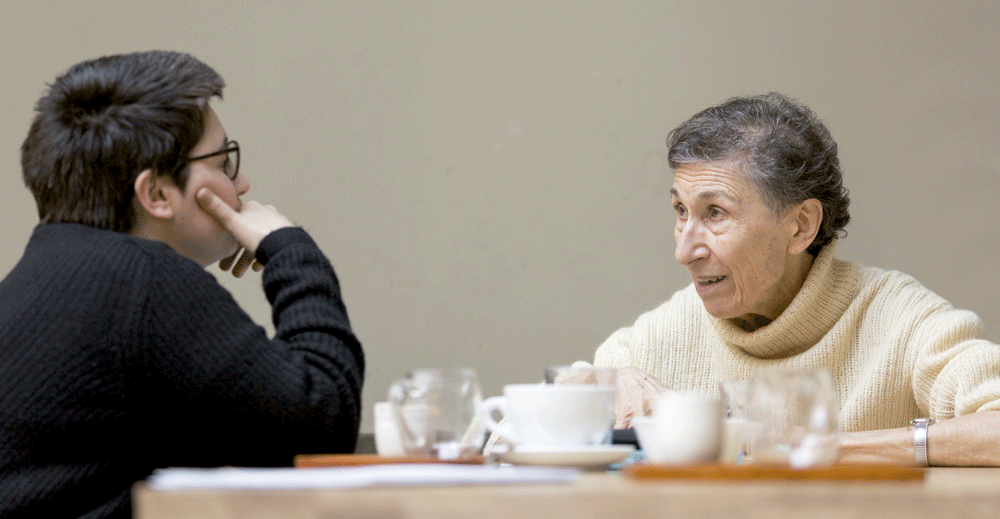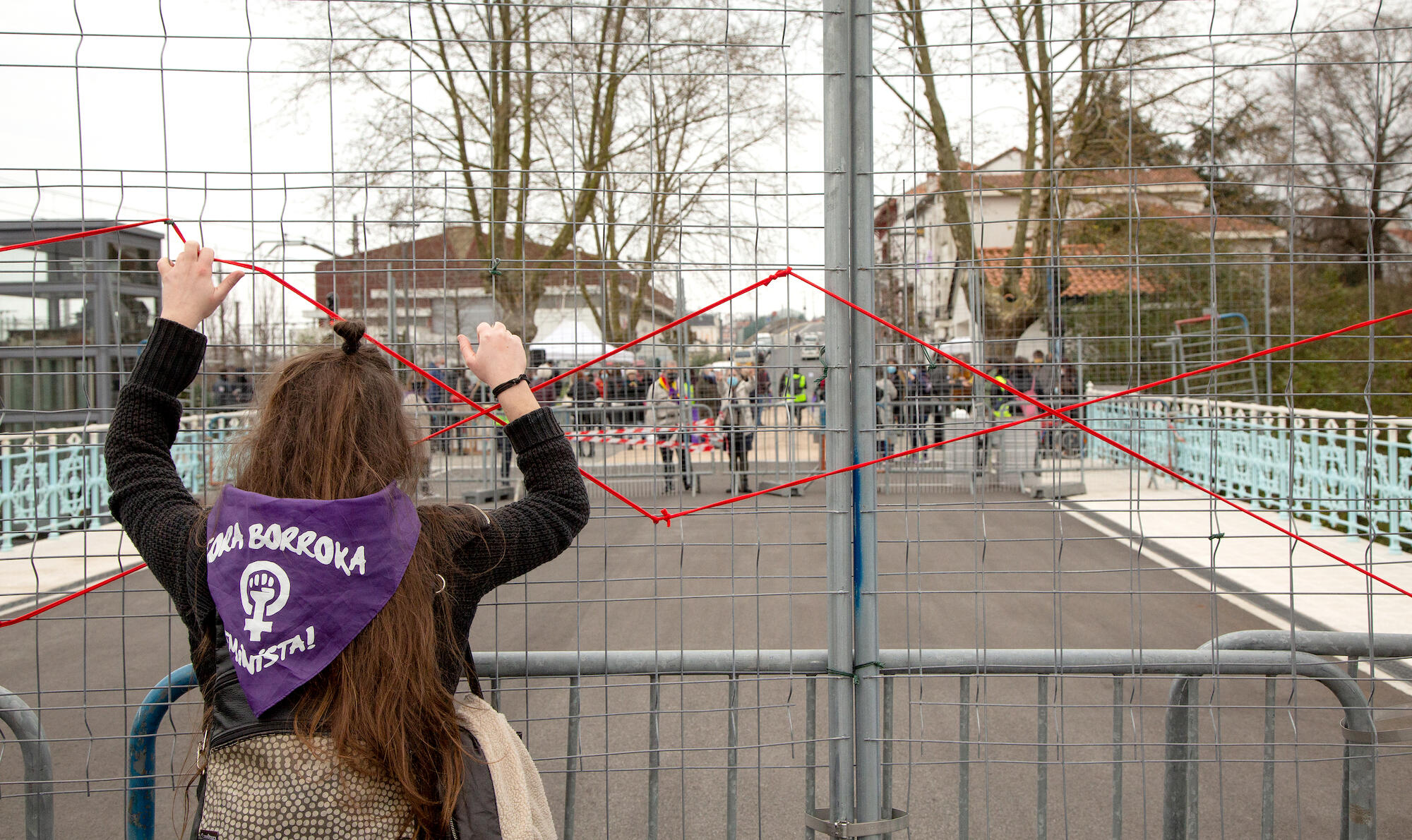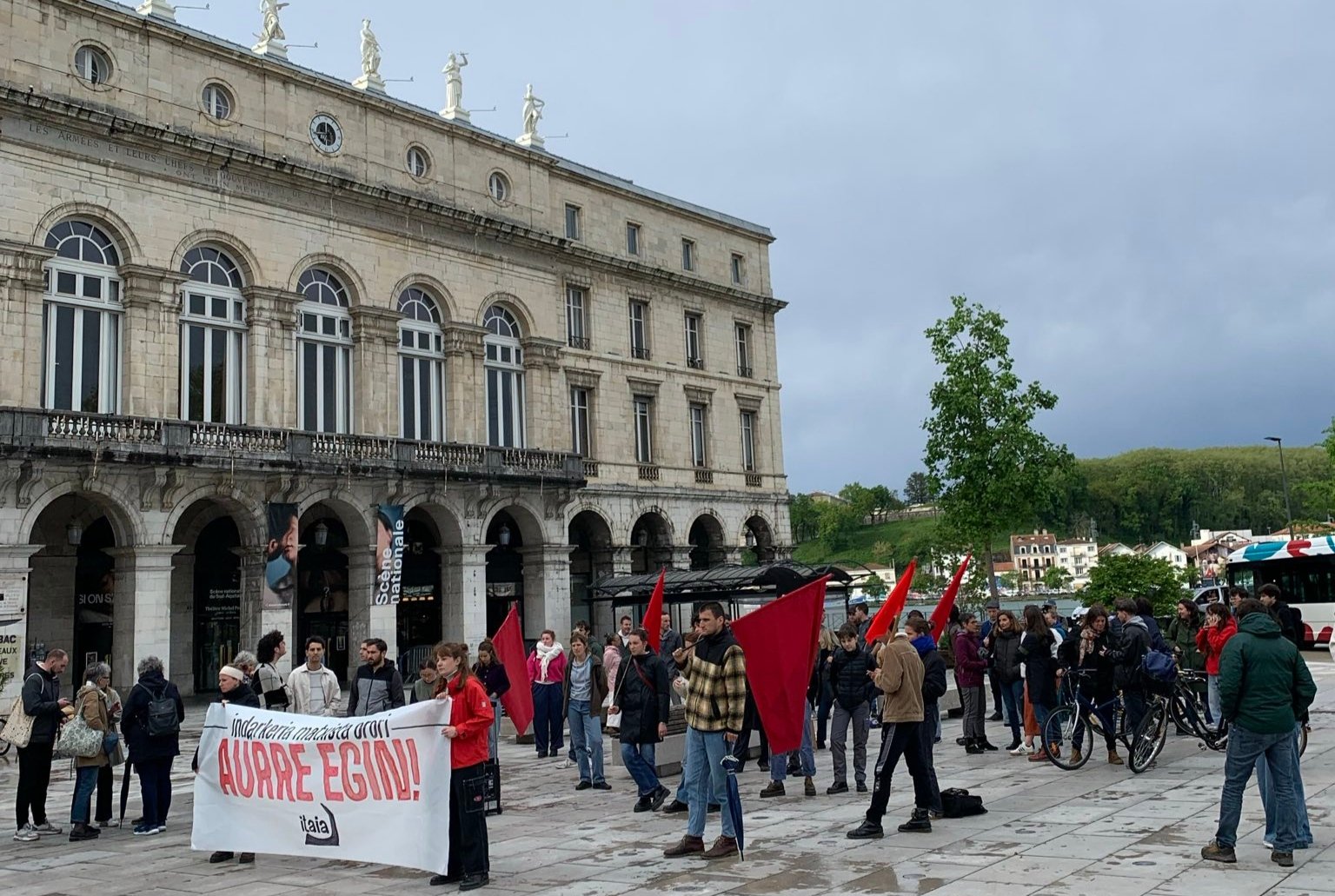"Women carry in the skin the identity of the unpaid worker"
- A large room in Tabakalera was completed last December at the conference of feminist thinker Silvia Federici. The next day we meet with him and review his long and fruitful career: first, turn the meaning of women’s domestic tasks; then, analyze closely what globalization has brought to the women of the world; today, demand the need for common structures and solidarity.

Idazle, irakasle eta aktibista feminista da Silvia Federici. Italian jaio eta hazi zen, baina AEBetan bizi izan da azken 40 urteetan, eta han jardun da irakasle, New Yorkeko Hofstra unibertsitatean. Erreprodukzio-lana eta etxeko lanak izan ditu ikergai nagusi. Hainbat artikulu argitaratu ditu, eta bi liburu kaleratu: Caliban and the Witch: Women, the Body and Primitive Accumulation [Caliban eta sorgina: emakumeak, gorputza eta hasierako pilaketa] eta Revolution at Point Zero: Housework, Reproduction, and Feminist Struggle [Iraultza zero puntuan: etxeko lanak, erreprodukzioa eta borroka feminista].
How did it begin to analyse the political and economic nature of reproduction?
I was in the feminist movement, and around 1970 we had great debates about the concrete causes of the oppression that women under capitalism suffered. In our view, in capitalist society, all workers were trampled underfoot, but it was clear that in the case of women there was additional oppression. On the one hand, we agreed: reproductive work and household chores were one of the reasons for this oppression. What characteristics of this work led to discrimination: in that we could not agree.
What were the main perspectives?
There were two main theories: on the one hand, Marxist Socialist feminists believed that domestic chores did not generate capital, which was not productive work, but rather the imprint of a prequalified world, a personal service, to put it mildly. On the other hand, radical feminists thought that patriarchy was the source of women’s oppression, and it seemed to them that patriarchy was not an economic system, but a cultural system that has been maintained over time.
We didn't have enough of those two theories. The capitalist class continues to captivate people to get up to the last drop of their sweat, so if millions of women spent much of their lives working in exchange for their kisses, they couldn't stop producing benefits to the capitalist class.
You therefore claimed a different conception.
Yes. From our point of view, workers were produced through domestic tasks (cooking, washing clothes, making children and taking care of them), it was not a personal service, but a set of tasks that every day, from generation to generation, produce the ability of people to work, because the workforce does not come from itself, we have to innovate continuously.
It was a kind of revolution. Reproductive work was not, as the Marxists have said, a work outside capitalism, but the basis of the organization of the work of capitalism, an activity that has made all other forms of work possible. From there we conclude that the capitalist class had to be installed as invisible and unpaid work, otherwise they could not accumulate so many goods.
Then you created the “Wages for Domestic Work” movement.
We propose as a strategy the provision of salaries in exchange for household tasks, not as a revolution or as an objective. Salary was a strategy to change relationships, not just inside the home, but outside the home, because when women work outside the home, we carry on the skin the identity of the unpaid worker, and therefore, we are a cheap workforce. The elderly know with what despair we want that wage, they know that we are used to working for free, that we do not recognize our work as important and that we will gladly thank the crumbs they give us.
In your last book you say that World War II had to do with all these reflections, and that someone should look at that influence.
The truth is that Italian feminists Leopoldina Fortunati and Mariarosa Dalla Costa wrote a book about it: Brutto Ciao (as opposed to Bella Ciao).
They studied post-war and environmental Italy and, according to them, war was a milestone, as it broke the relationship of women with the state and their family. Yes, in the post-war period, women continued to marry and bring children; however, this other illusion, widespread in the time of fascism, according to which the patriarchal family supported women, was broken. The war showed that women had to protect themselves and, in addition, women realized that they did not want to continue producing children for the state, so that they would then send them to war and slaughter them.

And what influence did it have in the United States?
The women of the city, however, were affected in a very different way. During the war, women entered the arms industry and many were paid for the first time, lived their first experience when working outside the home. In addition, in order to stimulate women’s work, the United States Government created almost utopian structures: centres were built where women could go in the morning, leave children and recollect them at dusk, where food, clean clothes were also gathered…
The government ended the war, the men returned from the front and beat him to death. They fired the architects, and instead of those structures, they started building the suburbs to isolate women and move men away from their workplaces, so that they didn't join the unions. In short, golden cages were created to welcome the nuclear family.
How has your vision of reproduction work changed over the last 40 years?
On the one hand, in the 1990s, I worked in Nigeria for three years as a university professor, and that's where for the first time I met land and subsistence agriculture. So I realized that for a lot of African women, reproduction started in the field. When I arrived in Nigeria, the World Bank had already launched a campaign against subsistence farming, which is still in place.
On the other hand, globalisation has changed the situation. In the West, a multitude of women are working on wages in low jobs with no great chance of being self-employed. The policies of the International Monetary Fund have led women from impoverished countries to other Western countries to work as sex workers and caregivers, despite having learned a great deal in the world. In the wage campaign, we believed that all women shared something for reproduction, for differences. However, after the structural adaptations of the 1980s and 1990s, it is much more difficult to find that link.
We hear you that globalization is not an innocent process.
Globalization is a revolution that responds to the incredible revolutionary wave that the international capitalist class reached in the 1960s. Globalisation has several faces, but, on the whole, it is clear that it is an absolutely political manoeuvre (the entire capitalist economy is political).
It is key to know whether the capitalist class is able to maintain certain levels of exploitation. To do so, the capitalists did what they usually do in times of crisis: destroy people’s livelihood resources; so, you have to accept stronger forms of exploitation. That's why they destroyed communal assets, not just land and forests, but those we have described as commons, although they actually belonged to the public sector, like pensions or free education.
What were the first steps in this counter-revolution?
It all started with the debt crisis, which, by the way, was created entirely artificially in the late 1970s. It was an instrument for the implementation of the old colonial system. Among other things, they offered loans to newly independent African countries with a very low interest in getting them to the level of the advanced countries by buying technology. Then, the United States Federal Reserve increased interest rates, the dollar increased, and overnight, those countries could not pay for it. On the basis of the debt, they had to withdraw the investments: education, health, transport… They started exporting the raw materials and buying others in the open air. The economy of these countries collapsed. Nigeria, for example, had been a pretty rich country and people had no choice but to leave.
“The World Bank and the United Nations Institute have opened up a kind of rhetoric in which globalization has favored women more, but it is a lie.”
How has globalization affected women?
The World Bank and the United Nations (UN) have launched a kind of rhetoric: That globalization has favored women more, but it's a lie.
The Left has moved more slowly, but the UN soon realized the revolutionary capacity of the feminist movement and from the very beginning it was seen that women could take advantage of their strong desire for autonomy to strengthen globalization: the maquilas [a type of workshop], public services are dominated by women; our computers are made by young women from China, under such harsh working conditions that it is the way of fighting many people who threaten themselves. The global economy restarts behind the backs of women. We cannot, therefore, accept that paid work has been liberated by women.
Working for free has not left them, however.
No, no. Free work must be destroyed, because we are giving the capitalist class all that work done in exchange for kiss, and they are using it to further impoverish women. In relation to domestic tasks, there are three important, interrelated steps: the elimination of free labor, the social valuation of domestic tasks and the shift in the way of organizing them. How do you do that? In the 1970s, we proposed salary. Now, however, I have a more global view and I have seen how easy money is being handled, so I would also propose other things. However, the issue of reproduction must be brought to a different level. From the reproductive point of view, all kinds of struggles can be worked out, for example, in favor of housing: if our houses are factories, where we produce labor force, we would not have to pay a rent for the place where we work. They are provocations, but I think they are useful.
In the light of all the changes we have mentioned, what kind of resistance would you propose today?
I was convinced that in the 1970s, and I believe with even more conviction than then, firstly, in order to transform the world, feminist mobilization has to be an anti-capitalist vision and, secondly, it has to consider the struggle for reproduction fundamental, for two reasons. On the one hand, reproduction is the fundamental field for exploiting women, and furthermore, it is in this area that capitalist relations surprise us for the first time, in which we begin to absorb the capitalist vision of life. On the other hand, I now know you can't build any strong political movement of organization or mass unless you change reproduction. To change society, it is essential to change the reproduction: how we reproduce you, you will make politics of that kind.
Common structures, that's another concept that's been working on lately. What is the difference between public and common structures?
Let me give you an example. I was almost all the time in Italy between 2005 and 2008, due to my mother's disease. We hired a nurse to take care of her in the mornings: half of the service was paid by us and the other half the city hall, therefore, was partly public. Many of the nurses were huge, very majestic, but it was a nightmare, because every two days they were changing nurse and we were very nervous, because we had to teach a new person to touch my mother almost every day. Not only that: my mother is a mature woman and needs someone to show her naked body to create a certain relationship and confidence with that person. Of course we have to defend the public sector, but if the public sector takes into account only the logic of efficiency, profits and saving money, it will not give us what we need.
That is why we need common structures. We need spaces, of course, but above all, we need to recover solidarity between people, which is a common good, and create structures for decision-making. I'd like to see them, community assemblies with a certain frequency, so that we start discussing from below, for example, what health is and what kind of health we want.
Without one, the other is not.
The construction of strong toilets requires other kinds of measures. As Amaia Pérez Orozco said, you have to shorten the working day, because if you do 10 hours in the office, you don't have time to actively participate in the community. Everything is related.
.jpg)
Errepikatu nirekin: Sara Millerey. Ez dezagun ahaztu bere izena. Transfeminizidioaren biktima da Millerey: gorrototzaile transmisogino batek torturatu zuen, besoak moztu zizkion eta bizirik bota zuen ibaiertz batera. Bi orduko agoniaren ondoren hil zen.
Errazagoa da J.K... [+]
Many Basque feminists have been disappointed to learn that writer Chimamanda Ngozi Adichie has externalized pregnancy, meaning that a surrogate has fertilized her baby for money.Adichie is the author of the essay We should all be feminists, among others. They have ignored the... [+]
Indartsua, irribarretsua eta oso langilea. Helburu pila bat ditu esku artean, eta ideia bat okurritzen zaionean buru-belarri aritzen da horretan. Horiek dira Ainhoa Jungitu (Urduña, Bizkaia, 1998) deskribatzen duten zenbait ezaugarri. 2023an esklerosi anizkoitza... [+]
Gozamen aparta bezain deskribatzeko zaila dakar, norbaiten hitzak irakurri edo entzun ostean, zera pentsatzeak: “Horixe zen neu aurreko hartan azaltzen saiatu nintzena!”. Idazlea eta itzultzailea da María Reimóndez, eta galegoz aritzen da, hizkuntza... [+]
Orain arte desgaituak ez diren pertsonekin lehiatu da Uharteko Ipar Eski Taldeko Eneko Leyun eskiatzailea (Iruñea, 1998). 2024-2025 denboraldian, lehenengo aldiz parte hartu du Adimen Urritasuna duten Pertsonentzako Iraupeneko Eskiko Espainiako Txapelketan. Urrezko... [+]
Joan den urte hondarrean atera da L'affaire Ange Soleil, le dépeceur d'Aubervilliers (Ange Soleil afera, Aubervilliers-ko puskatzailea) eleberria, Christelle Lozère-k idatzia. Lozère da artearen historiako irakasle bakarra Antilletako... [+]
























